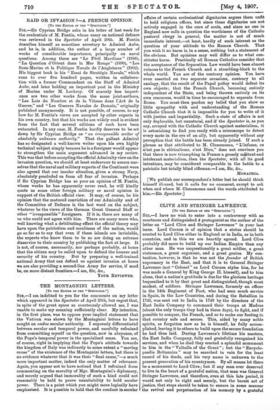THE MONTAGNINI LETTERS.
[To THE EDITOR OP THE SPECTATOR.1
Sra,—I am indebted to you for the comments on my letter which appeared in the Spectator of April 20th, but regret that, in spite of the great space so courteously allowed me, I was unable to make my meaning sufficiently clear. My intention,, in the first place, was to oppose your implied statement that the Vatican was shown by the Montagnini letters to have sought an undue secular authority. I expressly differentiated between secular and temporal power, and carefully refrained from committing myself on the question, now in abeyance, of the Pope's temporal power in the specialised sense. You are, of course, right in implying that the Pope's attitude towards the kingdom of Italy was indirectly to some extent a " moving cause" of the existence of the Montagnini letters, but there is no evidence whatever that it was their "final cause,"—a much more important matter, indeed the only matter of relevance. Again, you appear not to have noticed that I refrained from commenting on the morality of Mgr. Montagnini's diplomacy,. and merely argued that immorality of such a kind could not reasonably be held to prove unsuitability to bold secular power. There is a point which you might more logically have emphasised. It is possible to hold that the conduct in secular affairs of certain ecclesiastical dignitaries argues them unfit to hold religious offices, but since these dignitaries are not actively engaged in the cure of souls, and since no one in England now calls in question the worthiness of the Catholio pastoral clergy in general, the matter is not of much immediate interest,—at least, hardly of such interest as the question of your attitude to the Roman Church. That you wish it no harm is, in a sense, nothing but a statement of the obvious. But opinions may well differ as to what con- stitutes harm. Practically all Roman Catholics consider that the acceptance of the Separation Law would have been almost ruinous to the French Church and a stumbling-block to the whole world. You are of the contrary opinion. You have even asserted on two separate occasions, contrary to all analogy, that the result of the Papal policy would defeat its own objects ; that the French Church, becoming entirely independent of the State, and being thrown entirely on its own resources, would in time be encouraged to separate from Rome. You must then pardon my belief that you show so little sympathy with and understanding of the Roman Catholic Church that it is impossible for you to write of it with justice and impartiality. Such a state of affairs is not only deplorable, but unnatural, and if the Spectator is, as you say, arrayed with the Catholic Church against materialism, it is astonishing to find you ready with a microscope to detect every mote in the eye of an ally, but apparently without any perception that the battle has been already joined. If such a phrase as that attributed to M. Clemenceau, " L'infame, ce n'est pas le clericalisme, &est Dieu," does not convince you that there is now triumphing in France a grossly militant and intolerant materialism, then the Spectator, with all its good intentions, may be considered comparable in the battle to a patriotic but totally blind rifieman.—I am, Sir, &a., MoLkortze.
[We publish our correspondent's letter lest he should think himself ill-used, but it calls for no comment, except to ask when and where M. Clemenceau used the words attributed to him.—ED. Spectator.]














































 Previous page
Previous page